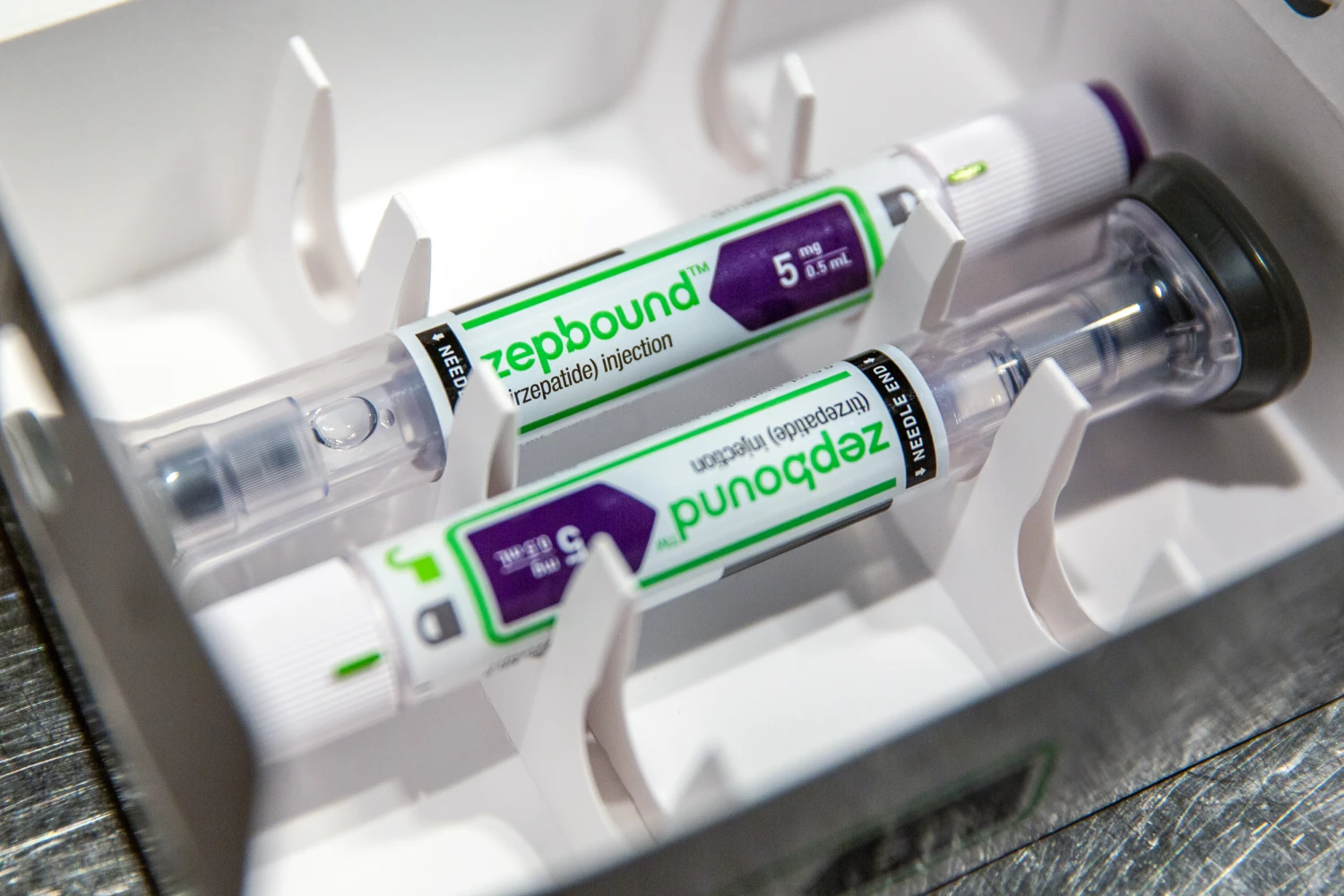
FDA Approves Zepbound: A Game-Changer for Obstructive Sleep Apnea and Obesity Treatment
The U.S. Food and Drug Administration (FDA) has taken a groundbreaking step in addressing obstructive sleep apnea (OSA) with the approval of Eli Lilly’s weight-loss drug, Zepbound (tirzepatide). This marks the first pharmacological treatment approved specifically for OSA in adults with obesity, revolutionizing how this sleep disorder can be managed.
This approval is a major win for patients and healthcare providers, offering a new solution to a chronic condition that has traditionally relied on mechanical devices like CPAP machines.
(Facebook: Like, X: Follow, Telegram: Join us)
Obstructive Sleep Apnea: A Widespread Health Challenge

Obstructive sleep apnea is a prevalent sleep disorder characterized by repetitive pauses in breathing due to airway obstruction during sleep. Common symptoms include:
- Loud snoring
- Daytime fatigue
- Poor concentration
- Morning headaches
OSA isn’t just a nuisance—it’s a significant health risk. Untreated OSA can lead to severe complications such as high blood pressure, heart disease, stroke, and type 2 diabetes.
For years, the primary treatment has been Continuous Positive Airway Pressure (CPAP) devices, which work by keeping the airways open during sleep. While effective, CPAP devices are often cumbersome and challenging for patients to use consistently.
How Obesity Influences Sleep Apnea

Obesity is one of the leading causes of obstructive sleep apnea. Excess fat around the neck and throat can narrow the airways, making it harder for air to pass through during sleep.
Weight loss is often a critical component of OSA management, but traditional methods like diet and exercise can be slow and difficult to sustain. This is where Zepbound offers hope.
What is Zepbound?

Zepbound (tirzepatide) is part of a class of drugs known as GLP-1 receptor agonists. Initially developed to treat type 2 diabetes, these medications have proven highly effective for weight management.
Zepbound mimics hormones that help regulate appetite and digestion. By:
- Reducing food cravings
- Slowing gastric emptying
- Encouraging feelings of fullness
Zepbound enables significant weight loss, addressing the root cause of OSA for many individuals.
FDA Approval Backed by Rigorous Clinical Trials

The FDA’s decision to approve Zepbound for OSA is grounded in robust clinical evidence. Two Phase 3 trials evaluated the drug’s effectiveness in reducing OSA symptoms in 469 adults with obesity and moderate to severe OSA.
Key Findings from the Trials
- Reduction in Apnea Events:
Participants using Zepbound experienced a significant decrease in the apnea-hypopnea index (AHI), the measure of breathing interruptions during sleep. Reductions ranged from 25 to 29 events per hour, compared to only about 5 events per hour in the placebo group. - Improved Sleep Quality:
Patients reported fewer nighttime awakenings, improved restfulness, and reduced daytime fatigue. - Weight Loss Achievements:
Zepbound users lost a considerable percentage of their body weight, which directly contributed to improvements in airway function. - Enhanced Overall Health:
Additional benefits included better blood pressure control and improvements in cholesterol levels.
Zepbound vs. Traditional Treatments
The introduction of Zepbound doesn’t necessarily replace existing OSA treatments like CPAP but offers an alternative or complementary approach:
| Feature | Zepbound | CPAP |
|---|---|---|
| Mechanism | Targets weight and obesity | Keeps airways open mechanically |
| Convenience | Weekly injection | Nightly device usage |
| Immediate Relief | No | Yes |
| Long-Term Benefits | Yes, through weight loss | No, manages symptoms only |
Broader Implications of Zepbound’s Approval

The approval of Zepbound signals a shift in how healthcare addresses obesity-linked conditions like OSA. By tackling the underlying cause—excess weight—this drug offers benefits that extend far beyond sleep apnea:
- Reduced Cardiovascular Risk: Weight loss improves heart health and reduces the risk of hypertension.
- Improved Diabetes Management: GLP-1 receptor agonists are proven to enhance blood sugar control.
- Enhanced Quality of Life: Better sleep, more energy, and reduced health complications contribute to overall well-being.
Challenges and Considerations
While Zepbound is a significant breakthrough, it’s not without limitations:
- Cost and Accessibility: The price of Zepbound may be a barrier for some, though insurance coverage is expected to expand following FDA approval.
- Side Effects: Common side effects include nausea, vomiting, and diarrhea, which typically decrease over time.
- Gradual Results: Unlike CPAP, which provides immediate relief, Zepbound requires time to achieve substantial weight loss.
Who Should Consider Zepbound?
Zepbound is approved for adults with obesity and moderate to severe OSA. Ideal candidates are those who:
- Struggle to maintain weight loss through diet and exercise alone
- Experience significant OSA symptoms affecting their quality of life
- Are seeking a long-term solution to manage obesity-related health risks
Patients should consult their healthcare providers to determine if Zepbound is the right choice for their specific needs.
What’s Next for Zepbound and OSA Treatment?
The approval of Zepbound has far-reaching implications:
- Expanded Applications: Research is ongoing to explore the drug’s potential for other obesity-related conditions.
- Increased Accessibility: Wider insurance coverage and potential Medicare inclusion could make Zepbound accessible to more patients.
- Healthcare Evolution: The success of Zepbound may inspire further development of pharmacological solutions for chronic conditions tied to obesity.
FAQs About Zepbound and Obstructive Sleep Apnea
How does Zepbound work for OSA?
Zepbound promotes weight loss, reducing fat around the airways and alleviating the symptoms of obstructive sleep apnea.
Is Zepbound a replacement for CPAP?
No, Zepbound does not provide immediate relief like CPAP. However, it addresses the underlying cause of OSA and may reduce dependence on CPAP over time.
What are the side effects of Zepbound?
Common side effects include nausea, vomiting, diarrhea, and fatigue, which typically lessen with continued use.
Who is eligible for Zepbound?
Zepbound is approved for adults with moderate to severe OSA and obesity.
Will insurance cover Zepbound?
Coverage varies, but the FDA approval for OSA is likely to increase insurance and Medicare coverage.
How soon will Zepbound show results?
Weight loss and improvements in OSA symptoms typically occur gradually over several months.
A New Era in OSA Treatment
The FDA’s approval of Zepbound for obstructive sleep apnea is a monumental step forward in addressing a condition that has long relied on mechanical interventions. By targeting obesity, Zepbound offers a comprehensive, long-term solution that could improve the lives of millions.
As the medical community continues to embrace innovations like Zepbound, the future of obesity and OSA treatment looks brighter than ever. Patients struggling with these conditions now have more options—and more hope—than ever before.
Do Follow For More News : DailyForesight



